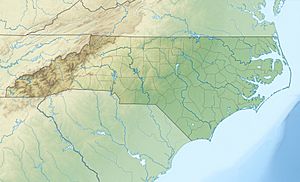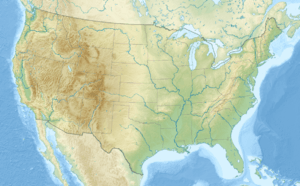Lacys Creek facts for kids
Quick facts for kids Lacys Creek |
|
|---|---|
|
Location of Lacys Creek mouth
|
|
| Other name(s) | Tributary to Rocky River |
| Country | United States |
| State | North Carolina |
| County | Chatham |
| Physical characteristics | |
| Main source | Brush Creek divide about 1.5 miles northwest of Siler City, North Carolina 642 ft (196 m) 35°45′12″N 079°29′56″W / 35.75333°N 79.49889°W |
| River mouth | Rocky River about 2 miles north of Siler City, North Carolina 525 ft (160 m) 35°46′28″N 079°27′39″W / 35.77444°N 79.46083°W |
| Length | 4.30 mi (6.92 km) |
| Basin features | |
| Progression | generally northeast |
| River system | Deep River |
| Basin size | 4.31 square miles (11.2 km2) |
| Tributaries |
|
| Bridges | Old US 421, US 421, Piney Grove Church Road, Sycamore Lake Road 1382 |
Lacys Creek is a small stream, about 4.30 miles (6.92 km) long, located in Chatham County, North Carolina. It's a "tributary," which means it flows into a larger river called the Rocky River. Fun fact: Lacys Creek is the only stream with this exact name in the entire United States.
Where Lacys Creek Starts and Flows
Lacys Creek begins its journey about 1.5 miles (2.4 km) northwest of a town called Siler City, North Carolina. This starting point is in Chatham County. From there, Lacys Creek flows generally towards the northeast. It travels for a few miles before joining the Rocky River. This meeting point is about 2 miles (3.2 km) north of Siler City.
Understanding the Lacys Creek Watershed
A "watershed" is an area of land where all the water, like rain or melting snow, drains into a common point, such as a river, lake, or ocean. The Lacys Creek watershed covers about 4.31 square miles (11.2 square kilometers). This means that all the rain that falls in this area eventually makes its way into Lacys Creek.
The area around Lacys Creek gets a good amount of rain, about 48.0 inches (122 cm) each year. A large part of this watershed, about 58%, is covered by forests. These forests are important because they help keep the water clean and provide homes for many plants and animals.
 | James B. Knighten |
 | Azellia White |
 | Willa Brown |



